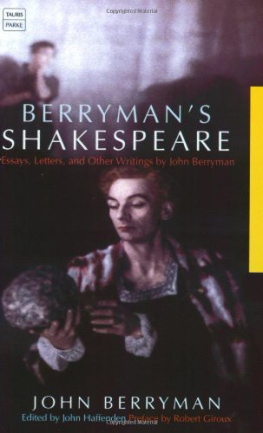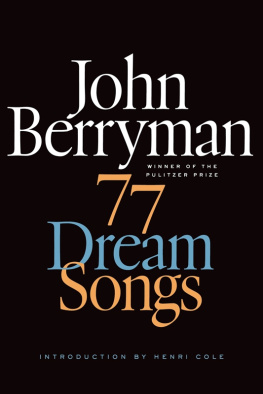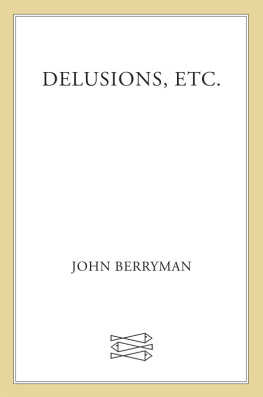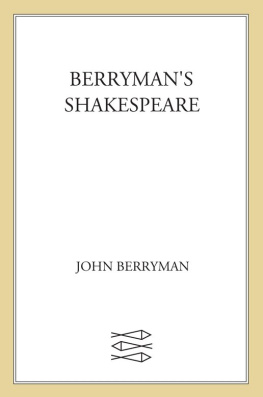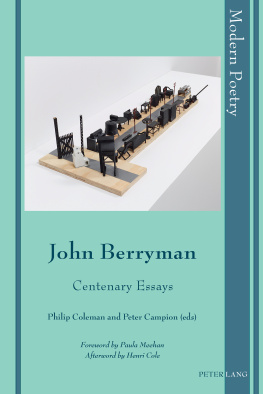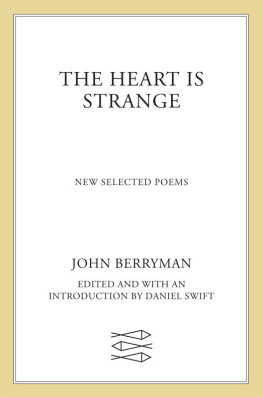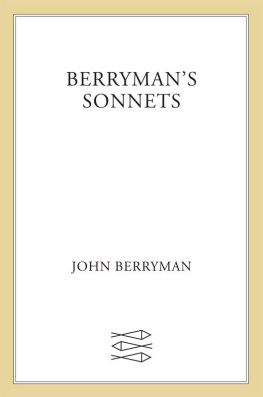John Berryman - The Selected Letters of John Berryman
Here you can read online John Berryman - The Selected Letters of John Berryman full text of the book (entire story) in english for free. Download pdf and epub, get meaning, cover and reviews about this ebook. publisher: Harvard University Press, genre: Detective and thriller. Description of the work, (preface) as well as reviews are available. Best literature library LitArk.com created for fans of good reading and offers a wide selection of genres:
Romance novel
Science fiction
Adventure
Detective
Science
History
Home and family
Prose
Art
Politics
Computer
Non-fiction
Religion
Business
Children
Humor
Choose a favorite category and find really read worthwhile books. Enjoy immersion in the world of imagination, feel the emotions of the characters or learn something new for yourself, make an fascinating discovery.

- Book:The Selected Letters of John Berryman
- Author:
- Publisher:Harvard University Press
- Genre:
- Rating:5 / 5
- Favourites:Add to favourites
- Your mark:
- 100
- 1
- 2
- 3
- 4
- 5
The Selected Letters of John Berryman: summary, description and annotation
We offer to read an annotation, description, summary or preface (depends on what the author of the book "The Selected Letters of John Berryman" wrote himself). If you haven't found the necessary information about the book — write in the comments, we will try to find it.
The Selected Letters of John Berryman — read online for free the complete book (whole text) full work
Below is the text of the book, divided by pages. System saving the place of the last page read, allows you to conveniently read the book "The Selected Letters of John Berryman" online for free, without having to search again every time where you left off. Put a bookmark, and you can go to the page where you finished reading at any time.
Font size:
Interval:
Bookmark:
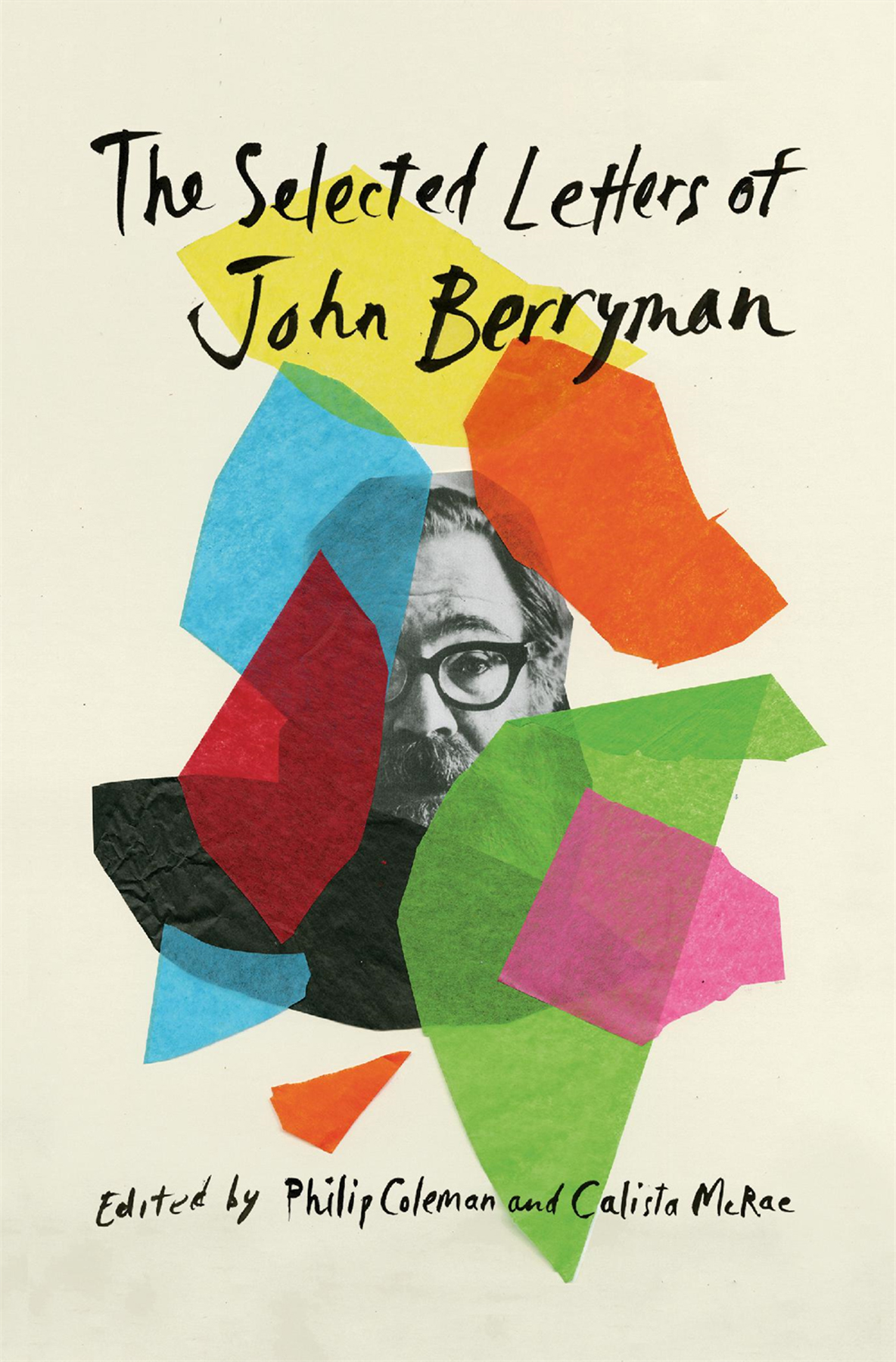
The Selected Letters of John Berryman
Edited by
Philip Coleman and Calista McRae
Foreword by Martha B. Mayou
T HE B ELKNAP P RESS OF H ARVARD U NIVERSITY P RESS
Cambridge, Massachusetts & London, England2020
Copyright 2020 by the President and Fellows of Harvard College
John Berryman letters, copyright 2020 by Kathleen Ann Donahue
All rights reserved
Jacket design by Jaya Miceli
Jacket photo of John Berryman Terence Spencer / LIFE Picture Collection / Getty Images
978-0-674-97625-2 (cloth)
978-0-674-25032-1 (EPUB)
978-0-674-25033-8 (MOBI)
978-0-674-25034-5 (PDF)
The Library of Congress has cataloged the printed edition as follows:
Names: Berryman, John, 19141972, author. | Coleman, Philip, editor. | McRae, Calista, 1986 editor.
Title: The selected letters of John Berryman / John Berryman; edited by Philip Coleman and Calista McRae; foreword by Martha Mayou.
Description: Cambridge, Massachusetts : The Belknap Press of Harvard University Press, 2020. | Includes bibliographical references and index.
Identifiers: LCCN 2020010252
Subjects: LCSH: Berryman, John, 19141972Correspondence. | Poets, American20th centuryCorrespondence.
Classification: LCC PS3503.E744 Z48 2020 | DDC 811/.54dc23
LC record available at https://lccn.loc.gov/2020010252
My family and I are grateful to Philip Coleman and Calista McRae for their interest in the life of John Berryman, and we welcome this end result of their industry. This volume will be a valuable resource for people seeking to learn about Berryman. These letters connected a far-flung network of his friends and fellow writers, and are fascinating snapshots of the literary milieu of his time.
These days its without cost to pick up a telephone, send an email, or video chat with your friends and muses. But the documents here show the value of a letter writers solitary contemplation and painstaking committal of fleeting thoughts to paper. It seems to me that this encourages correspondents to work through their ideas in a way that does not arise with more direct communication.
Two biographies of Berryman have been written, but his letters represent a direct testimony in a voice that is substantially different from a biographers: the reader is listening in on the writer speaking about his life and work. We are happy that this long-anticipated edition will take its place alongside scholarship on John Berryman and will further enrich our understanding of the poet and his craft.
MARTHA B. MAYOU
I think that in letters, as in no other form of writing, the man appears.
John Berryman, unpublished essay written at Columbia College, spring 1934
THE EARLIEST LETTER in this volume was written in September 1925, by a young boy who signed himself John Allynnot yet the poet who would become known as John Berryman. Sent to his parents, John and Martha Smith, the letter is formal, dutifully detailed, and determined to reassure them that their son is having funeven though he clearly misses them. His account of life at boarding school concludes: I love you too much to talk about. Slightly less than a year later, in June 1926, he was forced to confront the death of his father. The letters gathered here speak to that loss on many occasions (as when he writes in 1955 to Saul Bellow, my father died for me all over again last week). This strand of Berrymans storyof early loss, entangled with the depression, guilt, and alcoholism present for much of his lifeis familiar to most readers of his poems, and the letters references to what he called plights & gripes in Dream Song 14 can be wry, proud, and desperate, by turns. In August 1948, Berryman tells James Laughlin, Im happy Pound seems bettermaybe he & I can change places. Several weeks into a March 1967 hospital stay, he tells Arthur Crook of the Times Literary Supplement that I am a wreck, but Sir a gorgeous wreck. Writing to Ann Levine in the fall of 1964, he declares that a series of recent illnesses is simply my mind tearing my body to pieces with anxiety. While these letters delineate periods of immense stress, they also show an affectionate son, brother, partner, parent, and mentor, and they chart Berrymans development as one of the most original poets of his generation.
Berrymans letters began appearing in print several decades ago. We Dream of Honour, a generous selection of his letters to his mother, was published in 1988, edited by Richard J. Kelly. Other letters have been quoted in biographies by John Haffenden (1982) and Paul Mariani (1990); in E. M. Hallidays memoir, John Berryman and the Thirties (1987); and in Haffendens Berrymans Shakespeare (1999). This book represents the first wide-ranging selection from Berrymans correspondence. There are letters here to almost two hundred people, including editors, fellowship committees, family members, academic colleagues, and students who would themselves become well-known writers, such as Edward Hoagland, Adrienne Rich, and Valerie Trueblood. As a sophomore at Columbia in 1934, beginning an essay on Horace Walpole, Berryman asserted that letters had a special capacity to reveal a persons character, but he tended to take a dim view of his own correspondence. I hate letters, he says to E. M. Halliday in September 1936, before going on to list everything he would discuss with his friend if they could meet in person (poetry, esp. mine & Yeats ; drama, esp. yours & Shakespeares). At such times, he seems to see letters as lacking the lively give-and-take of actual conversation; at others, he seems troubled by how much a letter might disclose. Writing to Eileen Mulligan in the spring of 1942, he declares that I have developed a habit of fulness in communication with you which does not let me appear much less disagreeable on paper than I am in person.
Many of Berrymans letters are short and practical. It is perhaps surprising that he found time to write as many letters as he did; he took on projects constantly (variously driven by aspirations, dedication, and financial exigencies), and put an enormous amount of energy into them. By 1928, at South Kent School in Connecticut, he was sending his family short stories and comic essays; a December 1930 letter to his mother refers to the student newspaper The Pigtail, on whose editorial board he served. By the other end of the 1930s, he would be poetry editor for The Nation. The letters he sent as Nation editor reveal a conscientious if at times downright cranky reader of contributors work: he could be passionately encouraging and insightful, or curt and dismissive. Later in his career, when he was no longer involved with magazines as a named editor, Berryman continued to be troubled by literatures place in American culture, as evident in a 1947 letter to Walter Stewart proposing the establishment of a literary review: a new, authoritative instrument of documentation and enquiry. Late letters show him requesting books on art history and philosophy, trying to organize a repeat of the 1962 National Poetry Festival, compiling an anthology, and drafting a long poem entitled The Children. Writing to his friend and former professor Mark Van Doren in 1971, he compares himself with A. E. Housman, who had what Berryman calls a really bifurcated personality, but Berryman himself appears not so much divided as overextended when he moves between the activities of editing and researching (on topics ranging from the identity of Mr. W. H. to The Historical Personality of Christ), grading papers and revising poems. His letters document a literary drive visible whether he is working on someone elses writing or on his own manifestly hard-won poems. Robert Lowell pointed to this quality in his elegy for Berryman: We asked to be obsessed with writing, / and we were.
Font size:
Interval:
Bookmark:
Similar books «The Selected Letters of John Berryman»
Look at similar books to The Selected Letters of John Berryman. We have selected literature similar in name and meaning in the hope of providing readers with more options to find new, interesting, not yet read works.
Discussion, reviews of the book The Selected Letters of John Berryman and just readers' own opinions. Leave your comments, write what you think about the work, its meaning or the main characters. Specify what exactly you liked and what you didn't like, and why you think so.

